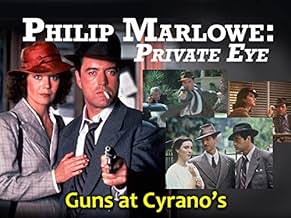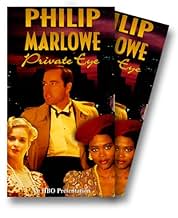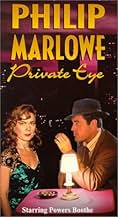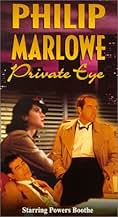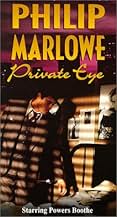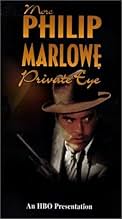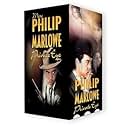Agrega una trama en tu idiomaPrivate detective Philip Marlowe solves many crimes in Los Angeles during the 1930s.Private detective Philip Marlowe solves many crimes in Los Angeles during the 1930s.Private detective Philip Marlowe solves many crimes in Los Angeles during the 1930s.
- Premios
- 2 premios ganados y 13 nominaciones en total
Explorar episodios
Opiniones destacadas
Raymond Chandler practically invented the detective noir genre with his Philip Marlowe novels and stories. The trench coat. The fedora. The monotone first-person narration and the cynical outlook on life. They all started with Raymond Chandler's Philip Marlowe.
So it's only appropriate that several actors have brought Phillip Marlowe to life over the years, most notably James Garner and Humphrey Bogart.
It's hard not to keep Humphrey Bogart's portrayal in mind when watching a Philip Marlowe mystery, and most actors understandably pale by comparison. That said, Powers Boothe still does a worthy job. You must put all of the sleazy roles he's ever played out of your head. He perfectly portrays Philip Marlowe as a cynical private investigator with a tough exterior but a heart of gold.
Samuel Matlovsky's musical score is the icing on the cake. The background music, and especially the haunting theme tune, definitely enhance the 1930's gumshoe atmosphere.
I've only seen a few episode from the '86 series. These episodes of "Phillip Marlowe: Private Eye" are filled with clever twist and turns, exciting gun fights, and plenty of tough-talking wise guys. If nothing else, they will inspire you to seek out the writings of Raymond Chandler.
So it's only appropriate that several actors have brought Phillip Marlowe to life over the years, most notably James Garner and Humphrey Bogart.
It's hard not to keep Humphrey Bogart's portrayal in mind when watching a Philip Marlowe mystery, and most actors understandably pale by comparison. That said, Powers Boothe still does a worthy job. You must put all of the sleazy roles he's ever played out of your head. He perfectly portrays Philip Marlowe as a cynical private investigator with a tough exterior but a heart of gold.
Samuel Matlovsky's musical score is the icing on the cake. The background music, and especially the haunting theme tune, definitely enhance the 1930's gumshoe atmosphere.
I've only seen a few episode from the '86 series. These episodes of "Phillip Marlowe: Private Eye" are filled with clever twist and turns, exciting gun fights, and plenty of tough-talking wise guys. If nothing else, they will inspire you to seek out the writings of Raymond Chandler.
I've meant to post a review of this ground-breaking series for some time. The untimely passing of Powers Boothe this week has goaded me into action...
To sum up: this series is not just the best adaptation of Raymond Chandler's Philip Marlowe, it's the *only* adaptation that really manages to to remain true to the letter and the spirit of the books. Amazing, but true.
Humphrey Bogart was charming as Marlowe, of course... but his Big Sleep (especially the best-known edit) is 99% Howard Hawks, and should have a 'may contain traces of Chandler' warning on the label. What's more, Bogey couldn't have been much less like the character described by Chandler. In fact, Chandler's own ideal Marlowe is said to have been Cary Grant, which gives you some idea of just how far off-track Bogart, the geriatric Mitchum, and others have been. (Let us not even speak of Dick Powell.) Robert Montgomery could have been good, but he loused it up with that stupid first-person camera business, which has never worked and never will. Astoundingly, the best Marlowe prior to Boothe was Elliott Gould, in Altman's modernized, revisionist yet nonetheless evocative Long Goodbye. (EDIT: forgot to mention James Garner, who was very good, though a bit more Rockford than Marlowe.)
But Powers Boothe was an even more appropriate choice. He had just the right age, just the right gravitas - the world-weary toughness of a Bogart or Mitchum, but also the class, the energy and the good looks described by Chandler. He also had the advantage of being less familiar. When you looked at Boothe you didn't see a movie star - you saw Marlowe, a hard-working gumshoe, and nobody else.
The Boothe series also marked a rare attempt to include the *most* significant character from Chandler's stories: the city of Los Angeles. (The best previous attempt was, again, Altman's Long Goodbye.) Hawks' Big Sleep is set-bound, and could be taking place in New York as easily as LA. Mitchum's Marlowe was set in England - a travesty! The Powers Boothe series at least attempted to capture some of the gaudy, steamy, crazy city that Chandler created in his writing. Ironically, the series was not filmed in Hollywooed, but in Toronto, which gives you some idea of what can be done with a bit of creative camera work and a few judiciously-chosen locations.
Another very cool thing about this series is that instead of adapting The Big Sleep - YET AGAIN - it adapts some of Chandler's excellent short stories. We get that flavorful dialog, those evocative descriptions, and the dark noir-ish plots - all of them fresh and barely familiar to even the most devoted Marlowe fans.
Obviously, it's hard to beat Bogey and Hawks for sheer entertainment value. Or Altman for quirky, innovative filmmaking. But when it comes to all-out fidelity to the cherished Chandler stories, Powers Boothe in Philip Marlowe Private Eye has no rival.
To sum up: this series is not just the best adaptation of Raymond Chandler's Philip Marlowe, it's the *only* adaptation that really manages to to remain true to the letter and the spirit of the books. Amazing, but true.
Humphrey Bogart was charming as Marlowe, of course... but his Big Sleep (especially the best-known edit) is 99% Howard Hawks, and should have a 'may contain traces of Chandler' warning on the label. What's more, Bogey couldn't have been much less like the character described by Chandler. In fact, Chandler's own ideal Marlowe is said to have been Cary Grant, which gives you some idea of just how far off-track Bogart, the geriatric Mitchum, and others have been. (Let us not even speak of Dick Powell.) Robert Montgomery could have been good, but he loused it up with that stupid first-person camera business, which has never worked and never will. Astoundingly, the best Marlowe prior to Boothe was Elliott Gould, in Altman's modernized, revisionist yet nonetheless evocative Long Goodbye. (EDIT: forgot to mention James Garner, who was very good, though a bit more Rockford than Marlowe.)
But Powers Boothe was an even more appropriate choice. He had just the right age, just the right gravitas - the world-weary toughness of a Bogart or Mitchum, but also the class, the energy and the good looks described by Chandler. He also had the advantage of being less familiar. When you looked at Boothe you didn't see a movie star - you saw Marlowe, a hard-working gumshoe, and nobody else.
The Boothe series also marked a rare attempt to include the *most* significant character from Chandler's stories: the city of Los Angeles. (The best previous attempt was, again, Altman's Long Goodbye.) Hawks' Big Sleep is set-bound, and could be taking place in New York as easily as LA. Mitchum's Marlowe was set in England - a travesty! The Powers Boothe series at least attempted to capture some of the gaudy, steamy, crazy city that Chandler created in his writing. Ironically, the series was not filmed in Hollywooed, but in Toronto, which gives you some idea of what can be done with a bit of creative camera work and a few judiciously-chosen locations.
Another very cool thing about this series is that instead of adapting The Big Sleep - YET AGAIN - it adapts some of Chandler's excellent short stories. We get that flavorful dialog, those evocative descriptions, and the dark noir-ish plots - all of them fresh and barely familiar to even the most devoted Marlowe fans.
Obviously, it's hard to beat Bogey and Hawks for sheer entertainment value. Or Altman for quirky, innovative filmmaking. But when it comes to all-out fidelity to the cherished Chandler stories, Powers Boothe in Philip Marlowe Private Eye has no rival.
I saw this series first run and Not since but every time I see Powers Boothe this is what I remember. I may or may not have seen Bogart's portrayals at the time, I know I have since, but this is the more memorable Marlowe. Boothe was a relative unknown at the time. He'd played Jim Jones and then came this, hence it was a great time for him to step into a well known role and own it! Advertising at the time made a deal out of it being HBO's "first" something. First drama or first shot on film or something. I've forgotten what but the show was very worthy of the hype. I'm going now to search for a copy of the DVD. I think it's time to revisit this little gem!
As other reviewers have noted, the HBO Marlowe series consists of two different sequences. Shows 1-5 have great music, and a fine supporting cast as well as some novel plots. "The King is Yellow" is perhaps the best. Boothe is an excellent Marlowe and the period cars and sets are top notch.
The second sequence, shows 6-11 lack the music and some of the production values present in the earlier episodes. Too bad. But the scripts and Boothe are still good.
All 11 shows are now out as a 3-DVD boxed set for $20-$30 bucks from Gold Hill Entertainment. Video quality on the first 5 is not up to snuff, but this set is still worth having just to see Powers Boothe as Marlowe.
The second sequence, shows 6-11 lack the music and some of the production values present in the earlier episodes. Too bad. But the scripts and Boothe are still good.
All 11 shows are now out as a 3-DVD boxed set for $20-$30 bucks from Gold Hill Entertainment. Video quality on the first 5 is not up to snuff, but this set is still worth having just to see Powers Boothe as Marlowe.
Long before Sex in the City or Six Feet Under, HBO proved itself to be at the cutting edge of television when it released several episodes of Philip Marlowe, Private Eye, with Powers Boothe as the best Marlowe in film history (even better, in my view, than Humphrey Bogart, Dick Powell and Robert Mitchum). He's so authentic, so dead-on perfect, that I can't read Chandler's Marlowe stories without thinking about him. The episodes that aired in 1983 were, in my view, far superior to the series in 1986. The writing was better, the story lines were tighter, and they had a gritty, noirish atmosphere that made you think of Los Angeles in the early 1940s. Unfortunately, the 1986 episodes did not have the same Chandleresque seedy Los Angeles feel. For years, I watched and re-watched the original episodes on videotape, but--alas--I've long since lost those taped episodes and I haven't been able to find copies of them ever since. Let's hope HBO re-releases them on DVD. This was television at its absolute finest.
post-script: After writing this review, I discovered that the episodes are indeed available on DVD. What a great day I'm having!
post-script: After writing this review, I discovered that the episodes are indeed available on DVD. What a great day I'm having!
¿Sabías que…?
- TriviaBefore he died, Raymond Chandler informed his agent Helga Greene never to allow the character of Philip Marlowe to appear in a TV show. Helga Greene later allowed this show to be made after discussions with producer David Wickes.
- Citas
Philip Marlowe: Hollywood's the kind of town where they stick a knife in your back and then have you arrested for carrying a concealed weapon.
- ConexionesReferenced in Goodnight Sweetheart: In the Mood (1993)
Selecciones populares
Inicia sesión para calificar y agrega a la lista de videos para obtener recomendaciones personalizadas
- How many seasons does Philip Marlowe, Private Eye have?Con tecnología de Alexa
Detalles
- Fecha de lanzamiento
- Países de origen
- Idioma
- También se conoce como
- Philip Marlowe
- Locaciones de filmación
- Productoras
- Ver más créditos de la compañía en IMDbPro
Contribuir a esta página
Sugiere una edición o agrega el contenido que falta


